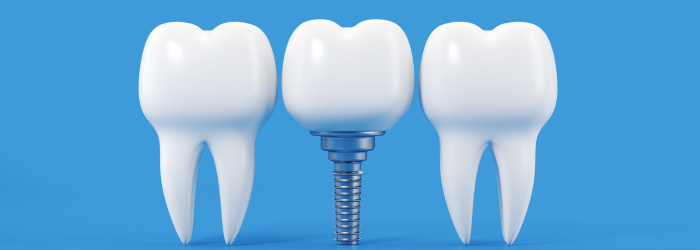Dental implants have become a popular and effective way to replace missing or damaged teeth. They are designed to look and function like natural teeth, and can provide patients with a long-lasting, durable solution to tooth loss. However, many people are still unsure about what the procedure involves and what to expect. In this blog post, we will explore the truth about dental implants, including the procedure, recovery, and benefits.
What are Dental Implants?
Dental implants are artificial tooth roots that are placed in the jawbone to support a replacement tooth or bridge. They are typically made of titanium, a biocompatible material that fuses with the jawbone over time. The implant acts as an anchor for the replacement tooth, providing stability and support.
Dental implants are a popular option for patients with missing or damaged teeth because they offer many benefits over other tooth replacement options, such as dentures or bridges. For example, implants are more durable, longer-lasting, and look and function like natural teeth.
The Dental Implant Procedure
The dental implant procedure typically involves several steps, which may take several months to complete. The process may vary depending on the patient’s individual needs and the complexity of the case. Here is an overview of the typical steps involved in the dental implant procedure:
-
Consultation and Evaluation: The first step is to schedule a consultation with a dental implant specialist. During this appointment, the dentist will evaluate your oral health and determine if you are a good candidate for dental implants. This may involve taking x-rays or performing other diagnostic tests.
-
Implant Placement: If you are a good candidate for dental implants, the next step is to place the implant in the jawbone. This involves making a small incision in the gum tissue and inserting the implant into the bone. The implant is then covered with a protective cap and left to heal for several months.
-
Abutment Placement: Once the implant has fused with the jawbone, a small connector called an abutment is attached to the implant. This serves as a foundation for the replacement tooth or bridge.
-
Tooth Replacement: Finally, a replacement tooth or bridge is attached to the abutment. This is typically a custom-made crown or bridge that is designed to match your natural teeth in size, shape, and color.
Recovery After Dental Implant Surgery
After dental implant surgery, patients will need to follow a strict post-operative care routine to ensure proper healing and prevent complications. Here are some tips for a smooth recovery after dental implant surgery:
-
Follow Post-Operative Instructions: Your dental implant specialist will provide you with detailed instructions for post-operative care. This may include avoiding hard or chewy foods, avoiding smoking, and keeping the surgical site clean.
-
Manage Pain and Discomfort: It is normal to experience some pain and discomfort after dental implant surgery. Your dentist may prescribe pain medication or recommend over-the-counter pain relievers to manage your symptoms.
-
Watch for Signs of Infection: In rare cases, infection may occur after dental implant surgery. Watch for signs such as swelling, redness, or discharge from the surgical site, and contact your dentist immediately if you experience any of these symptoms.
-
Attend Follow-Up Appointments: It is important to attend all follow-up appointments with your dental implant specialist to monitor your progress and ensure proper healing.
Benefits of Dental Implants
Dental implants offer many benefits over other tooth replacement options, such as dentures or bridges. Here are some of the key benefits of dental implants:
- Improved Appearance: Dental implants are designed to look and function like natural teeth, which can improve your appearance and boost your confidence.
Improved Speech: Missing teeth can affect your ability to speak clearly. Dental implants can restore proper speech function by providing support for replacement teeth or bridges.
- Improved Comfort: Dental implants are more comfortable than dentures or bridges because they are securely anchored in the jawbone and do not slip or shift.
- Improved Oral Health: Dental implants can help prevent bone loss and other oral health problems that can occur when teeth are missing.
- Improved Function: Dental implants function like natural teeth, allowing you to eat, speak, and smile with confidence.
- Long-Lasting: With proper care, dental implants can last a lifetime, making them a cost-effective option in the long run.
- Convenient: Dental implants require no special care or maintenance beyond regular brushing, flossing, and dental checkups.
Who is a Good Candidate for Dental Implants?
Not everyone is a good candidate for dental implants. To be a good candidate, you should have healthy gums and adequate bone density in your jaw to support the implant. You should also be committed to maintaining good oral hygiene habits and attending regular dental checkups.
If you are a smoker or have certain medical conditions such as uncontrolled diabetes, you may not be a good candidate for dental implants. Your dental implant specialist will evaluate your oral health and medical history to determine if dental implants are right for you.
Conclusion
Dental implants are a popular and effective way to replace missing or damaged teeth. They offer many benefits over other tooth replacement options, such as dentures or bridges, including improved appearance, comfort, and function. While the dental implant procedure may take several months to complete, the results are long-lasting and can provide patients with a durable solution to tooth loss.
If you are considering dental implants, it is important to schedule a consultation with a dental implant specialist to determine if you are a good candidate for the procedure. With proper care and maintenance, dental implants can last a lifetime and provide patients with a confident and healthy smile.
